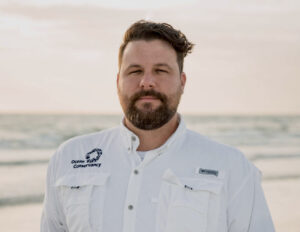By Jon Paul “J.P.” Brooker, Ocean Conservancy
As the Florida Legislature begins to reconvene in Tallahassee for its January session, we need our legislators to maintain their focus on resilience and to continue to make advancements that address the biggest existential threat of a generation: climate change.
By building on the gains made in the last session, we can produce durable results that will protect our coastal ecosystems, as well as our blue economy that is driven by a healthy ocean.
Floridians from all walks of life can attest that our ocean and coasts are under assault from a warming, rising sea, and we can see that the threats are growing. Warm water exacerbates hurricanes, red tides, blue green algal events and fish kills.

The changing climate alters animal behavior and makes fish migration patterns volatile. Rising seas pour water onto our streets, compromise our aging septic systems, inundate stormwater systems and flush saltwater into our fresh groundwater supplies. The threats to natural and human systems are becoming more apparent all the time.
Last session, under the leadership of House Speaker Chris Sprowls, R-Palm Harbor, and Senate President Wilton Simpson, R-Trilby, the Legislature took some of the most meaningful steps in Florida history to strengthen the state’s climate resilience.
SB 1954 created and funded the Resilient Florida Grant Program, directed the creation of a Statewide Flooding and Sea Level Rise Resilience Plan and, notably, created the Florida Flood Hub for Applied Research and Innovation at the University of South Florida College of Marine Science.
The creation of the Flood Hub will provide a quintessentially important clearinghouse of information and data on the effects that the rising sea will have on our state. The modeling produced by the Flood Hub will be invaluable for forecasting floods, floodplain inundation mapping, and assessing economic damage. With the former Chief Science Officer of Florida Tom Frazer at the helm at the College of Marine Science, the Flood Hub is certain to be a resilience science powerhouse.
As Speaker Sprowls enters the last year of his leadership term, I am looking forward to working with him. I encourage him to double down on his efforts on resilience and flooding, and to pave the way for Florida to be a leader on climate issues.
This can and should include enhancement and perpetuation of the resilience and adaptation components Sprowls has underscored, but it should also be expanded to include mitigation components.
There are bold actions that Florida can pioneer that will alleviate a warming ocean and climate, and there is an appetite among Floridians to take these challenges on.
Investments in blue carbon projects, which could include seagrass restoration and protection, for example, could help sequester carbon and also protect habitat for iconic Floridian species such as manatees that have suffered tragic losses over the past year due to compromised water quality and warming waters.
Making investments in protecting our blue economy now will pay dividends long into the future, and we encourage the Legislature to build a bold legacy for itself and for Florida’s ocean environment.
This op-ed first appeared in the Tampa Bay Times.
Jon Paul “J.P.” Brooker is an attorney and serves as Ocean Conservancy’s director of Florida Conservation. He is a sixth generation Floridian born and raised on the Indian River Lagoon in Brevard County.
“The Invading Sea” is the opinion arm of the Florida Climate Reporting Network, a collaborative of news organizations across the state focusing on the threats posed by the warming climate.



